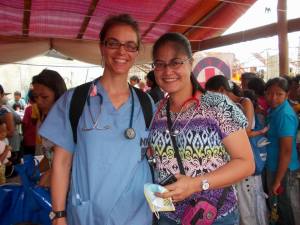The registered nurses of Baystate Franklin Medical Center (BFMC) have reached a tentative agreement on a new five-year contract, averting a one-day strike that …
Monthly Archives: February 2014
RNs Still Make A Difference in Philippines
 “I’d go back tomorrow,” states MNA member Megan Cassidy if she were asked to return to hurricane-ravaged Roxas, Philippines. And she’d be warmly welcomed by residents as well as the Registered Nurse Relief Network (RNRN) operation continuing to provide health services nearly three months after the area was decimated.
“I’d go back tomorrow,” states MNA member Megan Cassidy if she were asked to return to hurricane-ravaged Roxas, Philippines. And she’d be warmly welcomed by residents as well as the Registered Nurse Relief Network (RNRN) operation continuing to provide health services nearly three months after the area was decimated.
“The people we served are so appreciative that we keep coming,” said Cassidy who is back at her job as a pediatric nurse at Children’s Hospital in Minneapolis after volunteering in the Philippines from Jan. 15 – 27. ”But at the end of the day, it was my privilege to be there,” she added. “You can’t helped be touched when you see people with so little, still smiling, who want to cook for you.” One of Cassidy’s RNRN companions was a native of Roxas and his family would regularly bring home-cooked meals to the team.
From their main clinic, Cassidy’s group travelled to set up day camps in San Rafael, Estancia and a remote mountain village of Lemery. “We treated people who walked two hours to get to us,” said Cassidy. For some, it was the first time they had received any medical care in their lives. One day, Cassidy estimates that two of their physicians each saw at least 300 people. “Yet they were so patient,” said Cassidy, reflecting on the image of seeing “lots of people in a small space who had big needs.”
Cassidy was impressed by the effectiveness of the RNRN operation, which collaborated with the Philippines-based Alliance of Health Care Workers. “The trust and respect was already established, because our hosts knew the needs of the community so well.”
Cassidy describes citizens of a country living in danger every day. “Houses are down, infrastructure is down and people are displaced,” said Cassidy. The landscape is littered with steel beams bent in half, and sharp metal shards continue to be a source of injury. Downed power lines, flattened schools and a prominent oil spill hinder relief and reconstruction efforts.
The RNRN program is dedicated to providing health resources as long as needed. Even though the demand is great for volunteers, a limited number can go at any one time, due to funding restraints. And although RNRN is still accepting volunteers, National Nurses United (RNRN’s parent organization) encourages nurses to contribute financially to maintain this much-needed relief effort. Click here to learn how you can help.
Anything you can do will make a difference to the victims of Hurricane Yolanda. One of the biggest transformations might be your own. “You learn to prioritize; you learn what’s important,” said Cassidy. “We can all be global citizens, no matter where the need is.” Having conscious conversations can spark an idea or point us in a direction for overcoming inertia, and Cassidy is having those exciting discussions with co-workers “and everyone I know.”
Honor Nurses on Valentine’s Day with ANA’s Unique Collection of Historical Poems about the Heart and Soul of Nursing
Nurses Step Out to Help with ACA Enrollment
Statement from NYSNA President Judy Sheridan-Gonzalez, RN
We Stand With Striking Massachusetts Nurses
The 37,000 nurses of the New York State Nurses Association (NYSNA) stand with the sisters and brothers of t…
Final Call for Public Comment: Revised Position Statement on Fatigue
Ask a Travel Nurse: Do you get car rental expenses or do you have to use public transport?
Ask a Travel Nurse Question:
During an assignment, do you get car rental expenses or do you have to use public transport?
Ask a Travel Nurse Answer:
If you plan to travel for any extended period of time, I do recommend purchasing a reliable auto or truck and driving to the assignments yourself.
I do realize this can be a BIG undertaking for someone who may not be used to driving hundreds or even thousands of miles, but honestly, it is part of the adventure of travel nursing. Plus, you do not have to worry about rental cars or public transport when you get to an assignment.
There are companies out there that will offer rental car reimbursements, but like everything else in life, nothing is free. The company may offer it as one of their “no charge” benefits, but that money does come from somewhere in your compensation package (often resulting in less wage per hour than someone who declines this benefit).
You do need to research the city in which you will be working to see if mass transit is even an option. If you are talking New York, Chicago, or San Francisco, no problem. But small rural destinations may require your own set of wheels or a rental.
